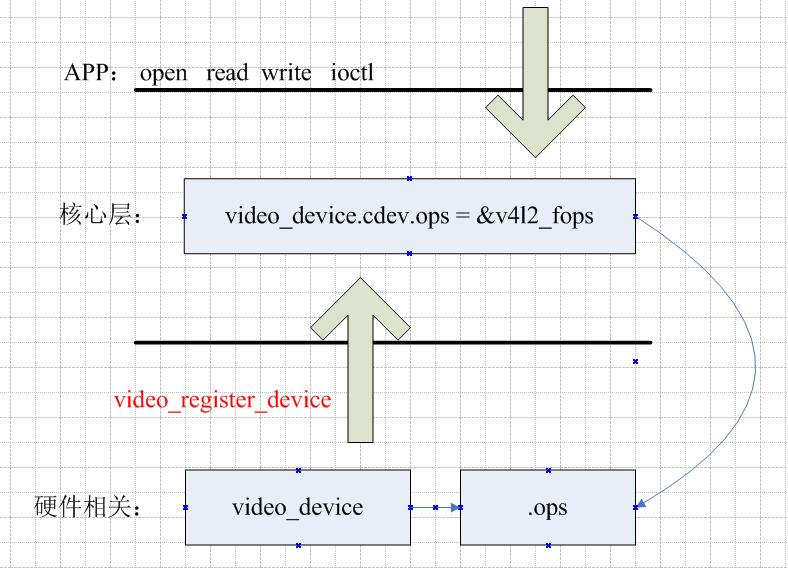V4L2学习(三)框架分析
整个v4l2的框架分为三层:
在应用层,我们可以在 /dev 目录发现 video0 类似的设备节点,上层的摄像头程序打开设备节点进行数据捕获,显示视频画面。设备节点的名字很统一,video0 video1 video2...这些设备节点在是核心层注册。
核心层 v4l2-dev.c,承上启下,对于每一个硬件相关层注册进来的设备,设置一个统一的接口 v4l2_fops ,既然是统一的接口必然不是具体的视频设备的操作函数,应用层调用 v4l2_fops 中的函数最终将调用到硬件相关层的 video_device 的 fops 。
硬件相关层,与具体的视频硬件打交道,分配、设置、注册 video_device 结构体。
static int __init videodev_init(void) { /* 申请设备号,留给 video 设备使用 */ dev_t dev = MKDEV(VIDEO_MAJOR, 0); ret = register_chrdev_region(dev, VIDEO_NUM_DEVICES, VIDEO_NAME); /* 创建 video 类 */ ret = class_register(&video_class); return 0; }
struct video_device { /* device ops */ const struct v4l2_file_operations *fops; /* sysfs */ struct device dev; /* v4l device */ struct cdev *cdev; /* character device */ /* Set either parent or v4l2_dev if your driver uses v4l2_device */ struct device *parent; /* device parent */ struct v4l2_device *v4l2_dev; /* v4l2_device parent */ /* Control handler associated with this device node. May be NULL. */ struct v4l2_ctrl_handler *ctrl_handler; /* Priority state. If NULL, then v4l2_dev->prio will be used. */ struct v4l2_prio_state *prio; /* device info */ char name[32]; int vfl_type; /* 'minor' is set to -1 if the registration failed */ int minor; u16 num; /* use bitops to set/clear/test flags */ unsigned long flags; /* attribute to differentiate multiple indices on one physical device */ int index; /* V4L2 file handles */ spinlock_t fh_lock; /* Lock for all v4l2_fhs */ struct list_head fh_list; /* List of struct v4l2_fh */ int debug; /* Activates debug level*/ /* Video standard vars */ v4l2_std_id tvnorms; /* Supported tv norms */ v4l2_std_id current_norm; /* Current tvnorm */ /* callbacks */ void (*release)(struct video_device *vdev); /* ioctl callbacks */ const struct v4l2_ioctl_ops *ioctl_ops; DECLARE_BITMAP(valid_ioctls, BASE_VIDIOC_PRIVATE); /* serialization lock */ DECLARE_BITMAP(disable_locking, BASE_VIDIOC_PRIVATE); struct mutex *lock; };
struct v4l2_device { struct device *dev; /* used to keep track of the registered subdevs */ struct list_head subdevs; spinlock_t lock; char name[V4L2_DEVICE_NAME_SIZE]; void (*notify)(struct v4l2_subdev *sd, unsigned int notification, void *arg); struct v4l2_ctrl_handler *ctrl_handler; struct v4l2_prio_state prio; struct mutex ioctl_lock; struct kref ref; void (*release)(struct v4l2_device *v4l2_dev); };
static inline int __must_check video_register_device(struct video_device *vdev, int type, int nr) { return __video_register_device(vdev, type, nr, 1, vdev->fops->owner); } int __video_register_device(struct video_device *vdev, int type, int nr, int warn_if_nr_in_use, struct module *owner) { int i = 0; int ret; int minor_offset = 0; int minor_cnt = VIDEO_NUM_DEVICES; const char *name_base; /* A minor value of -1 marks this video device as never having been registered */ vdev->minor = -1; /* 视频设备的设备节点一般为 video0 ..video 就是由此而来 */ switch (type) { case VFL_TYPE_GRABBER: name_base = "video"; break; case VFL_TYPE_VBI: name_base = "vbi"; break; ... } vdev->vfl_type = type; vdev->cdev = NULL; /* Part 2: find a free minor, device node number and device index. */ #ifdef CONFIG_VIDEO_FIXED_MINOR_RANGES switch (type) { case VFL_TYPE_GRABBER: minor_offset = 0; minor_cnt = 64; break; ... #endif /* 寻找一个空的项,这个好像并不重要 */ mutex_lock(&videodev_lock); nr = devnode_find(vdev, nr == -1 ? 0 : nr, minor_cnt); if (nr == minor_cnt) nr = devnode_find(vdev, 0, minor_cnt); if (nr == minor_cnt) { printk(KERN_ERR "could not get a free device node number\n"); mutex_unlock(&videodev_lock); return -ENFILE; } #ifdef CONFIG_VIDEO_FIXED_MINOR_RANGES /* 1-on-1 mapping of device node number to minor number */ i = nr; #else /* 在全局 video_deivce 数组中寻找一个空的项,下标+minor_offset作为设备的次设备号 */ for (i = 0; i < VIDEO_NUM_DEVICES; i++) if (video_device[i] == NULL) break; if (i == VIDEO_NUM_DEVICES) { mutex_unlock(&videodev_lock); printk(KERN_ERR "could not get a free minor\n"); return -ENFILE; } #endif vdev->minor = i + minor_offset; vdev->num = nr; devnode_set(vdev); if (vdev->ioctl_ops) determine_valid_ioctls(vdev); /* 注册字符设备 */ vdev->cdev = cdev_alloc(); vdev->cdev->ops = &v4l2_fops; vdev->cdev->owner = owner; ret = cdev_add(vdev->cdev, MKDEV(VIDEO_MAJOR, vdev->minor), 1); /* 得把device注册进内核,mdev才能自动创建设备节点,/dev 目录下的video0 等就是来自这里 */ vdev->dev.class = &video_class; vdev->dev.devt = MKDEV(VIDEO_MAJOR, vdev->minor); if (vdev->parent) vdev->dev.parent = vdev->parent; dev_set_name(&vdev->dev, "%s%d", name_base, vdev->num); ret = device_register(&vdev->dev); vdev->dev.release = v4l2_device_release; /* Part 6: Activate this minor. The char device can now be used. */ set_bit(V4L2_FL_REGISTERED, &vdev->flags); mutex_lock(&videodev_lock); video_device[vdev->minor] = vdev; mutex_unlock(&videodev_lock); return 0; } EXPORT_SYMBOL(__video_register_device);
static const struct file_operations v4l2_fops = { .owner = THIS_MODULE, .read = v4l2_read, .write = v4l2_write, .open = v4l2_open, .get_unmapped_area = v4l2_get_unmapped_area, .mmap = v4l2_mmap, .unlocked_ioctl = v4l2_ioctl, #ifdef CONFIG_COMPAT .compat_ioctl = v4l2_compat_ioctl32, #endif .release = v4l2_release, .poll = v4l2_poll, .llseek = no_llseek, };
static int v4l2_open(struct inode *inode, struct file *filp) { struct video_device *vdev = video_devdata(filp); if (vdev->fops->open) { if (video_is_registered(vdev)) ret = vdev->fops->open(filp); } } static ssize_t v4l2_read(struct file *filp, char __user *buf, size_t sz, loff_t *off) { struct video_device *vdev = video_devdata(filp); if (!vdev->fops->read) return -EINVAL; if (video_is_registered(vdev)) ret = vdev->fops->read(filp, buf, sz, off); } static int v4l2_mmap(struct file *filp, struct vm_area_struct *vm) { struct video_device *vdev = video_devdata(filp); if (!vdev->fops->mmap) return ret; ret = vdev->fops->mmap(filp, vm); } static long v4l2_ioctl(struct file *filp, unsigned int cmd, unsigned long arg) { struct video_device *vdev = video_devdata(filp); if (vdev->fops->unlocked_ioctl) { if (video_is_registered(vdev)) ret = vdev->fops->unlocked_ioctl(filp, cmd, arg); } else if (vdev->fops->ioctl) { if (video_is_registered(vdev)) ret = vdev->fops->ioctl(filp, cmd, arg); } }


